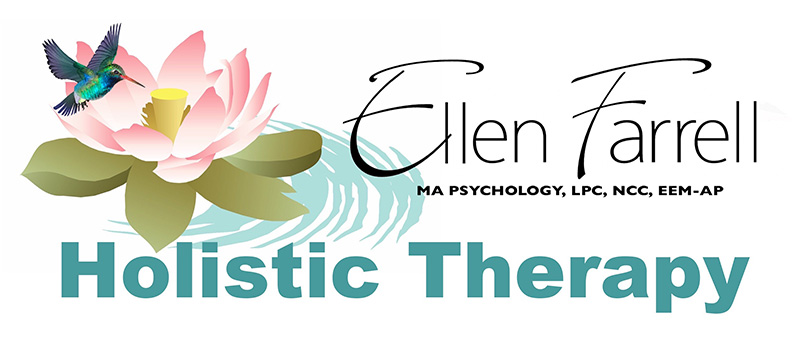What is Wellness?
By Ellen Farrell, MA, NCC, LPC, EEM-AP
Hopefully, this will dispel some myths, and give some clarifying explanations. What is wellness? It is one of those terms like “natural” – or nowadays, “No Cholesterol” – I spotted this on peanut butter labels, and p-nut butter is not a source of cholesterol! This type of unethical advertising can make labels very confusing. Trans-fats, a.k.a., margarine or hydrogenated oils, increase bad cholesterol levels and reduce good HDL levels (and they are often found added to peanut butters!). Seen just last week: “No Trans fats” on a popcorn label – and hydrogenated oil was an ingredient! So, yes the term “wellness” can become meaningless due to its’ broad usage, mis-use, and similarity to related topics.
Donald B. Ardell, Ph.D. describes some related areas with which wellness is confused (according to Dr. Dunn, originator of the term “wellness”, who saw wellness as a “lifestyle approach”) these are: holistic health, prevention, and health education/ promotion.
Sometimes those elements that contribute to wellness are individually called wellness, like: fitness and exercise, stress management, good nutrition, and medical/insurance provider’s financial support. For instance, a wellness check up is merely testing for a measurable disease, which does not directly create wellness! The truth is all of these factors comprise or contribute to a wellness approach to life.
Dr. Ardell feels holistic health is a merely “treatment oriented and practiced by healer-types”. However, holistic health is a model for achieving total wellness by addressing all areas of one’s experience i.e., that people are composed of mind, body and spirit.
In any event, he goes on to say a lot of things that are right on:
- that wellness is about determining what being healthy means to each individual;
- making a choice to be responsible for shaping that lifestyle; and
- having a conscious commitment to principles that lead to high levels of well being and life satisfaction.
Ardell states that the areas most closely affected by wellness commitments include: “self-responsibility, exercise and fitness, nutrition, stress management, critical thinking, meaning and purpose or spirituality, emotional intelligence, humor, play and effective relationships”.
Another physician, Dr. Dean Ornish describes wellness in a Vegetarian Times interview (March, 1998), as a “lifelong process”- improving the quality and length of our lives, through: “meditation, compassion, altruism, group support, commitment, communication skills, psychotherapy”.
Clearly, there is a lot of overlap in these definitions. Most of all it’s important to remember to ask: “What does being healthy mean to me?” And, “How can I be my personal best?” Also, “What can be done to support the creation of more health and balance right now?” When we are healthy on all levels (physiological, emotional, and spiritual), we are truly in the flow – moving toward achieving our fullest potential. It is a great goal, and makes for a wonder-full journey!
Updated in 2016. First printed in 2006 @ SCAD when Ellen was coordinating wellness services. The original article stated: “If you need support in developing any part of your wellness lifestyle program in response to that self-exploration, contact Ellen Farrell, efarrell@scad.edu. Farrell is a clinical counselor, now specializing in wellness issues in the Fitness and Recreation Department.”



Sorry, the comment form is closed at this time.